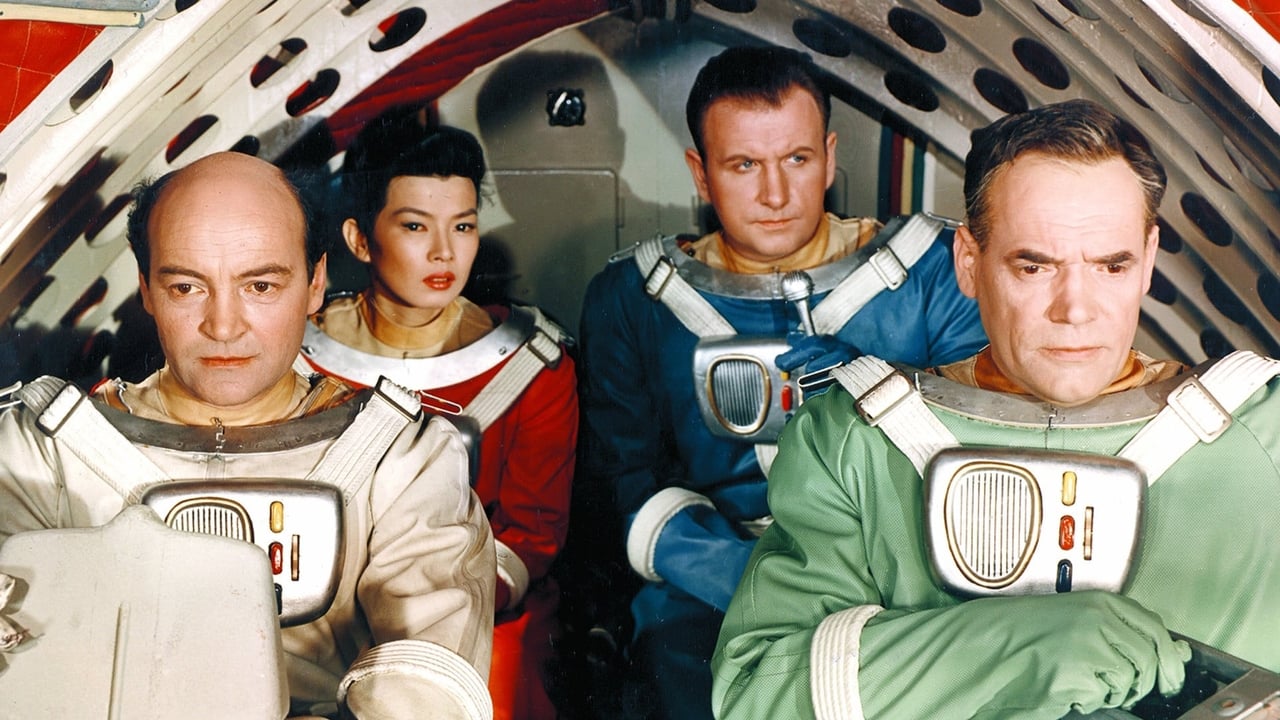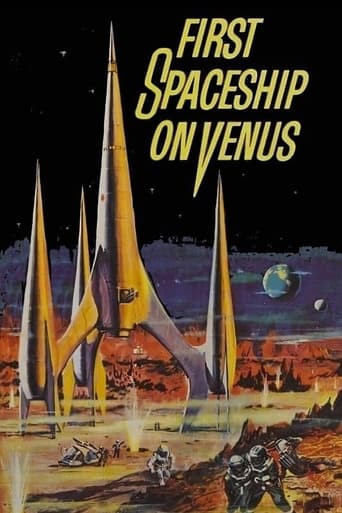

When an alien artifact discovered on Earth is found to have come from Venus, an international team of astronauts embarks to investigate its origins.Odd film made in East Germany during the cold war.When the film came to the states characters were switched in the dubbing.The film is interesting as a curio piece on two levels....the cold war angle AND just because it's sci fi from 1960 set in 1985.Over all the problem with the film is that it's overly slow. The action doesn't really get going until 2/3s into the film. But it's in color which is a rarity for a film made in 1960.It's worth a look see if you're a die hard early sci fi fan. If not you probably should move along.
... View MoreDer schweigende Stern (First Spaceship on Venus) is a superb science fiction film produced behind the Iron Curtain at the height of the Cold War. Fortunately, communist ideology does not feature prominently in the film though, no doubt, the producers were keen to create something that would rival - and exceed - the Hollywood films of the era. In this, they succeeded.With a screenplay written by no less a science fiction luminary than the great Polish author, Stanislaw Lem, the film is relatively realistic in its depiction of space flight, giving it a grittiness that the frequently camp offerings from the United States all too often lack.The set of the rocket ship's interior feels far more realistic than the garishly-painted plywood sets that would feature in Star Trek in just a few years' time.Likewise, the rocket's exterior model is strikingly stylised, giving it a unique appearance.The early realism gives way to a kind of surrealist feel when the ship lands on Venus. Special effects are used to good effect to create an atmospheric, thoroughly alien world of mists and sink-holes.In contrast to Lem's later Solyaris, the alien culture encountered here is comprehensible to humans. A paradox is presented in that the alien artifacts indicate that they were significantly more advanced on a scientific level, yet still retain the aggressive, warlike tendencies that the humans in this utopian tale have left behind.Indeed, the film follows the well-worn but still valid path of warning that our moral development has not kept pace with our scientific achievements. Here, the Venusians, intent on invading Earth, have unwittingly inflicted a nuclear apocalypse upon themselves.The cry for peace and nuclear disarmament gives this film its timeless appeal. Also of interest is the fact that the rocket from earth consists of an international crew working in harmony. Again, this predates the ideas in Star Trek by several years and there seems to be a greater emphasis on true egalitarianism in this film: there is no American captain lording it over his crew, which did so much to undermine Trek's message. Unfortunately, despite these good intentions, much more character development is needed as one feels little sympathy for the crew. They are all largely interchangeable characters.Unfortunately, the film does have weaknesses, both technical and in terms of plotting. The film stock is of poor quality, the camera work quite static and some of the acting is wooden. There are no bravura moments from the director: it is all very workmanlike.Furthermore, some cringe-worthy moments do creep in, despite the overall feel of gritty realism. For instance, the ship's scientist gives the robot a "heart" within moments by simply plugging a few wires into the machine. The fact that the archive recordings are stored in robotic insects is never explained, nor is the gravity repulsor that pushes the rocket away from the planet at the end.Depending on one's view, the revelation that the alien mud is in fact energy that has been converted back into matter is either very clever or ludicrous.Pacing is a little problematic at times with the momentous nature of the discovery that the Tunguskan artifact is, in fact, Venusian in origin being very rushed.In summary, despite its problems, this film is far superior to virtually all Hollywood science fiction, chiefly due to its realistic portrayal of space flight, grittiness and atmosphere.Its attempt to portray a utopian future in which all nationalities can work in harmony is a heartfelt one at the height of the Cold War.Its message of peace is also timeless and means this film is as relevant today as ever.Without doubt then, this is one of the greatest science fiction films and one that is sadly overlooked in favour of lesser offerings from the West.
... View MoreBack when Germany was divided politically and ideologically the Communist East German half gave us First Spaceship On Venus which is a rather self explanatory title. It hasn't worn well with time, but it's still open to speculation what's on Venus.A magnetic spool containing Venusian recordings is found in the wreckage of what was thought to be a meteor hitting the Siberian tundra in 1908. Just enough to arouse scientific curiosity is translated and an international expedition is formed.Back in 1908 things were happening on Venus and it was a more advanced civilization on that planet and more warlike. But a big old disaster happened and the Venusians were all killed. What happened to the Venusians is why you watch the film.The film is a plea for universal disarmament and it was made sincerely with the best of intentions. The message is laid on with a sledgehammer and the acting not great and the dubbing even worse.Still Walter Ulbricht who led East Germany back then had no real reason to be ashamed of the film, but it is sadly and badly dated.
... View More"First Spaceship on Venus", or its original (and better name) "The Silent Star"... maybe not bad for its time, and not bad with a budget that comes with an East German-Polish joint production. But even so, I just could not get through this picture.I fell asleep. Even watching the "Mystery Science Theater" version, which should have been funny, I just could not make it... I missed about ten minutes to dreaming. That is pretty bad. I was also sort of irked by the complete lack of science... sure, we maybe did not go to the moon yet, but by 1960 I think we knew quite well that Venus was not hospitable to life. So, um, yeah... terrible premise.I would still say it is okay to watch if you see it with the "Mystery Science Theater" jokes, but really, overall, I could not find a value in this film.
... View More